| | | | | |  Jess Suttner | | IN THIS ISSUE | That '90s show | When your boss exaggerates your work | Defogging the war in Ukraine | | | | Good morning. This week marked two years since Covid-19 was declared a global pandemic. Back then, as we were wiping down groceries and attending virtual raves from our living rooms, we all wondered how life would be different once this thing stopped tormenting us. Would we ever shake another person's hand again? Wear a suit? Go to a movie theater? With the vast majority of pandemic restrictions lifted in the US, now seems to be a good time to evaluate how Covid has changed us, as people. Here's a list of metrics compared to pre-pandemic levels. - US air passengers: 87% of pre-Covid levels
- NYC subway ridership: 56%
- Office occupancy: 38%
- US box office: Projected to be 60% of 2019 levels in 2022
- NFL attendance: Per-game average in 2021 up 0.9% from 2019
- Zoom stock: Down 8%
Covid has certainly transformed the world in profound ways. But all things considered, it might have been less influential in changing human behavior than we originally expected it to be. I welcome your thoughts. —Neal Freyman | | | | | | | | | Rich Fleischman, Chuck Klosterman in Minneapolis, Minn. on Sept. 20, 2009, CC BY-SA 3.0 OJ. The Real World. Really slow internet. The 1990s feels like a different universe, yet at the same time so relatable. But what was it actually like to live through the '90s? Writer Chuck Klosterman spent his pandemic trying to tease that out. In his new book, The Nineties, Klosterman takes readers on an energetic tour of what might be the last decade that actually felt like a decade. We talked to Chuck about the '90s. Why were so many '90s sitcoms set in coffee shops? In the '70s and the '80s there had been this archetype of the singles bar. There was this show called Three's Company, and when they weren't in their apartments they were at this local bar called the Regal Beagle, and it was the idea of a club or a bar where single people go to meet other people. That idea became an unseemly cliché by the '90s. I think the idea of a coffee shop was a less-charged, less-sexualized version of club culture. Some of it had to do with the fact that Starbucks became this meaningful thing that you could find anywhere and was successful anywhere. That became indicative of how a young person lived. What is interesting about a show like Friends, for example, is that outside of the two main apartments, the coffee shop is the main set piece. And what is intriguing about the Central Perk coffee shop in that show is that it is unlike any normal coffee shop that has ever existed. It's not a chain, it's not cool, it's pretty big, it seems to operate from this idea that a coffee shop is just a restaurant without much food. There's no secondary meaning to it. If they make it a Starbucks, then there's this message about corporate infringement. If they make it super cool, then the characters become super cool, and that's a different thing too because they're trying to make a show that's really relatable. So what they did was create this coffee shop that didn't exist in the '90s, or in New York, or any place at any time. It is the most generic idea of a coffee shop, and you can set a TV show there because it can have any meaning you want. Could the Marvel Cinematic Universe have happened in the '90s? The first half of the '90s had been dominated by independent film, and there was a belief that this was going to become the center of film culture, because in the '70s directors ran the movie business and the medium was a director's medium. You move to the '80s and it becomes more of a producer's medium. Movies were being made by people who asked, "What is a formula that succeeds, who are bankable stars, how much money do we spend to guarantee that even if everything goes wrong we'll break even?" The '90s come in and there's this sudden realization that you can make a movie on credit cards, that you can make a movie for under $25,000 and not only can you make that movie, because of technology it will look as good as a studio film, or at least close to it. So it seemed as though film was going to move back toward the place it had been in the '70s…until Titanic came out. It was massive in a way that no one saw coming—not even James Cameron. And that shifted movie culture back toward where it had been in the 1980s to some degree. And that is the inception of where we start seeing the idea of a Marvel universe, and the practicality of making the kind of films that are mostly about cinematic architecture: the building of the world, the fact that we understand everything we need to know about the character and the villain the first time they're introduced. What's the hardest part about writing a book? (Chuck asked himself this during our interview) You're supposed to say the actual writing, or the research, or the editing, but for me the hardest part is remaining the person that I am after the book comes out, because the book will never evolve. So if somebody goes back and reads [my previous books] they are essentially engaging with a 29-year-old version of me that I have very little relationship to anymore. And yet, it's not like it's fake, that was completely real when I wrote it, and I just have to sort of understand that I don't get to have my work change. And the more I change, the more uncomfortable I'm going to be, but at the same time I don't want to stop changing as a person. So I just have to accept the fact that the person who wrote my first book is now an alien to me. Let's say the US government put you in charge of creating a time capsule of the '90s for our future alien overlords. What would you put in it? This is a great question you're asking, but not because I have some great answer. Because I'm realizing that it's not necessary. Everything from the '90s does still exist, we haven't gotten rid of any of it. We don't need a time capsule, because we live in this world of perpetual now, where everything that has ever existed still to some degree exists for us, except for the things that we've literally forgotten. The time capsule of the '90s is probably the world we're living in—we're just opening it every day. This was just an excerpt of our interview with Chuck. You should definitely read the full thing here. This interview has been edited and condensed for clarity. | | | | | | We've had to pivot, adapt, and keep it pushin' a lot over the last two years. And when it comes to travel, planning a trip almost always triggers one of those headaches that start behind the eyes. battleface is here to ease the minds of today's globe-trotters. Their Trip Cancellation benefit can reimburse you up to 100% of your prepaid, nonrefundable trip costs if you need to cancel. With 20+ covered reasons, you can be in control when things don't go according to plan. Don't pay for a trip you didn't go on because of some unforeseen event, whether it's as conventional as an injury or as abrupt as a natural disaster. Plan with peace of mind and protect your next trip with battleface. | | | | Each week, our workplace whisperer Shane Loughnane answers a reader-submitted question about problems at work. Anything nagging at you? Ask Shane here. My boss has been exaggerating my work accomplishments (doubling cost savings figures, making up unfounded conclusions) and crediting me with the results. How can I tell him that I don't feel comfortable with his lies and exaggerations?—M. from Palo Alto Every so often, I think it's a good idea to preemptively let everyone know that you're tired of their lies and exaggerations. Perhaps I'm over-indexed on true crime docs like The Tinder Swindler, but my scammy senses are on high alert these days. Of course, dating apps are known to be fraught with embellishment and misrepresentation—it's reasonable to expect a bit more credibility from your workplace interactions. This seems like a particularly sly scheme that your boss is orchestrating. He's being dishonest, but not in a way that is (at least immediately) harmful to you. In fact, quite the opposite, as you are likely receiving a measure of praise for your work. The excellent results also reflect well on your boss, a seemingly modest leader whose deflection of credit is really a means of holding you accountable for the work's integrity. Meanwhile, the longer you allow it to continue, the more complicit you become. I'm almost always an advocate of dealing with the problem/person head on, but I worry about you confronting your boss on this. He could simply vow not to do it again, but that doesn't fix the lies that have already been told. Perhaps he'll agree to set the record straight—but will you be able to verify the follow-through and, in any case, is that a narrative you trust him to control? And that's assuming he has a positive reaction. In light of these concerns, and because this is really an ethical issue at its core, I'd really recommend escalating this to your boss's manager and/or someone in your HR department. Addressing an issue outside of typical reporting lines is never ideal, but a healthy workplace often relies on team members who are committed to maintaining its integrity. And while there's no guarantee this course of action will lead to a fair or painless solution, know that there is far greater risk in remaining quietly beholden to a disingenuous boss. If you have an issue at your workplace, share your concerns and maybe we'll reply to you in a future Brew. | | | BlackSky via Twitter Instead of writing fan fiction or knitting little cat hats, a growing cohort of internet power users are spending their free time compiling, analyzing, and disseminating wartime intelligence around the Ukraine–Russia conflict. By poring over social media posts, satellite images, and other publicly available datasets, internet sleuths are changing the narrative, and possibly the course of history. Even before Russia invaded Ukraine in late February, researchers had given the public unprecedented access to what's happening on the ground by using what's known as open-source intelligence (OSINT). They discovered Russia had decided to move into Ukraine hours before Russian President Vladimir Putin announced the "special military operation"—and they shared that intel on Twitter. How? - One researcher cross-checked a Google Maps traffic jam near the Russia-Ukraine border with satellite images of military vehicles that another sleuth had ID'd by analyzing an on-the-ground TikTok video—pinpointing the time that Russia's military convoy started to block the road at 3:15am.
- Although the military vehicles didn't use Google Maps to guide their warpath, enough Russian drivers commuting during the witching hour did, causing that stretch to turn red on the platform.
During the course of the war, OSINT researchers have also geo-located the precise coordinates of battle sites seen on social media, inventoried lost equipment, and intercepted radio transmissions. One teen college student sifts through flight tracking data on the platform ADS-B Exchange to identify and share the locations of Russian oligarchs' private jets. These findings inform how the media (like us, hi) report on the war, and in turn, how the public perceives it. So when Putin said he was pulling troops away from Ukraine's borders last month but satellite imagery showed otherwise, his placating lie flopped. OSINT's influence goes way beyond informing the masses. Associate Director of the Atlantic Council's Digital Forensics Lab Lukas Andriukaitis told NYMag the OSINT research often lands on NATO intelligence officials' desks: "Open source is a huge part of the work they're doing. There's no need to rely on a huge network of spies because guess what? It's out there for free." And OSINT's just getting started OSINT research began in earnest during the Syrian Civil War in 2011 and picked up momentum when Russia annexed Crimea from Ukraine in 2014. But the hypergrowth of social media (especially TikTok videos) combined with advances in satellite image technology has led to OSINT taking center stage in the current conflict. OSINT social media accounts have amassed hundreds of thousands of followers, and a Discord server for the community, Project Owl, has nearly 30,000 members that share and vet each other's work. More formal nonprofits have popped up to organize OSINT efforts as well, including the Digital Forensic Research Lab, Bellingcat, and the Centre for Information Resilience, while the New York Times and the Washington Post are creating their own internal teams of open-source analysts. Bottom line: Advancements in OSINT have been clearing the "fog of war" faster than eyeglasses after leaving a sauna. Spies, it might be time to come in from the cold if you haven't already.—JW | | | | | | | Welcome to Open Seas…err Open House, the only newsletter section that floats. We'll give you a few facts about a property and you try to guess the price.  Outer Reef Yachts Outer Reef YachtsToday's listing can be located in any state you want, as long as it's not landlocked. But even in a place like Iowa, there's nothing cooler than living in a big boat in the middle of a parking lot. This 65-foot yacht, called Miss Patti, was built to handle everything from a casual float to an episode of Deadliest Catch. Amenities include: - 3 beds (+ crew bunks) & 4 electric marine toilets
- Swim and dive platform
- Boat grill
- Guaranteed seasickness
How much to own the perfect music video location? | | | - What do Russians really think of the war? (GZERO Media)
- A brief history of the calorie. (JSTOR Daily)
- Nicolas Cage on playing Nicolas Cage. (The Hollywood Reporter)
- Who (ethically) owns recipes? Am I stealing them? (Adam Ragusea)
- A two-year, 50-million-person experiment in changing how we work. (New York Times)
- When the Midwest was once a tech hub. (Men Yell at Me)
- Sam Bankman-Fried on arbitrage and altruism. (Conversations With Tyler)
- Piano's darkest secret. (MusicalBasics)
- A Malaysia Airlines 777 disappeared this week in 2014. What happened to the plane? (The Atlantic)
- Meet the man who's lived on cruise ships for two decades. (Aeon)
Working in a changed world. The pandemic upended our work lives. But what's changed for good? And how are business leaders and employees at every step of their careers navigating workplace shifts? Find out in "As We Work," the latest podcast from The Wall Street Journal. Listen now.* *This is sponsored advertising content. | | | Welcome back to Morning Brew's Meme Competition, where we crown a single memelord every Sunday. Today's winner: Dave from Stamford, CT 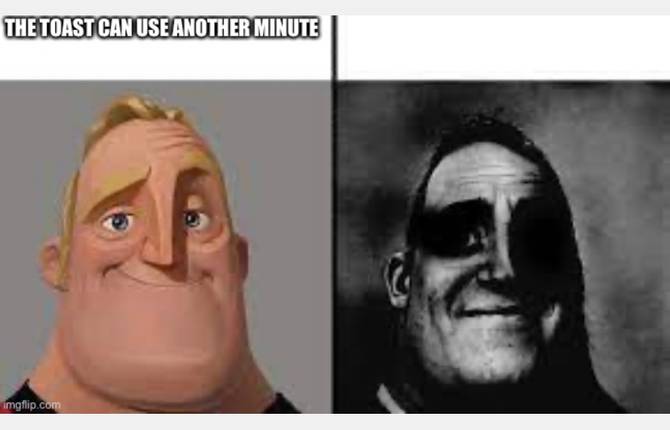 This week's challenge: You can find the new template here for next Sunday. Once you're done making your meme, submit it at this link for consideration. | | | | |  | Written by Neal Freyman, Max Knoblauch, Jamie Wilde, Matty Merritt, and Shane Loughnane Was this email forwarded to you? Sign up here WANT MORE BREW? Industry news, with a sense of humor → - Emerging Tech Brew: AI, crypto, space, autonomous vehicles, and more
- HR Brew: analysis of the employee-employer relationship
- Marketing Brew: the buzziest happenings in marketing and advertising
- Retail Brew: retail trends from DTC to "buy now, pay later"
Tips for smarter living →  Podcasts → Business Casual and Founder's Journal Podcasts → Business Casual and Founder's Journal  YouTube YouTube Accelerate Your Career → - MB/A: virtual 8-week program designed to broaden your skill set
| ADVERTISE // CAREERS // SHOP // FAQ
Update your email preferences or unsubscribe here.
View our privacy policy here.
Copyright © 2022 Morning Brew. All rights reserved.
22 W 19th St, 4th Floor, New York, NY 10011 | | |






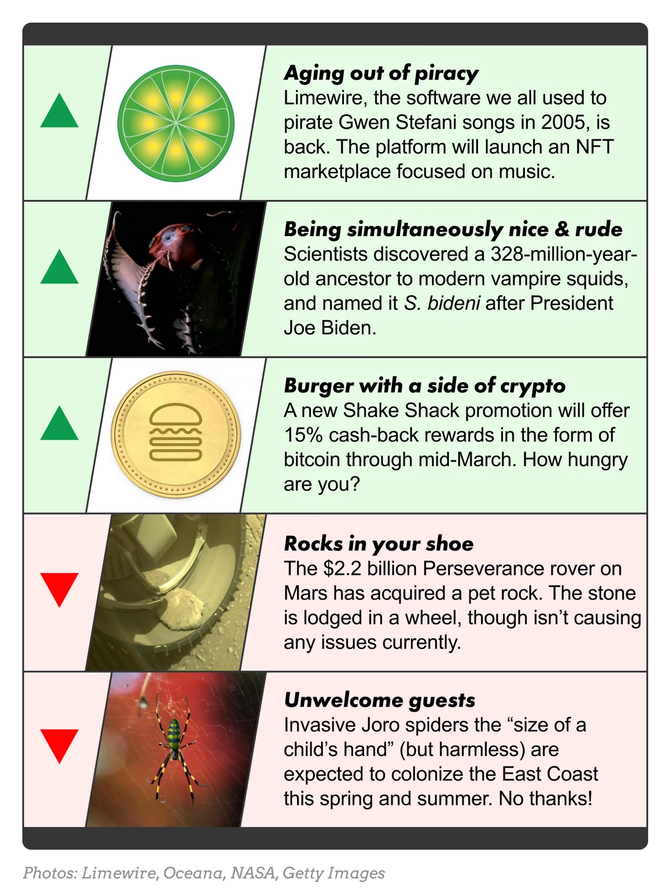
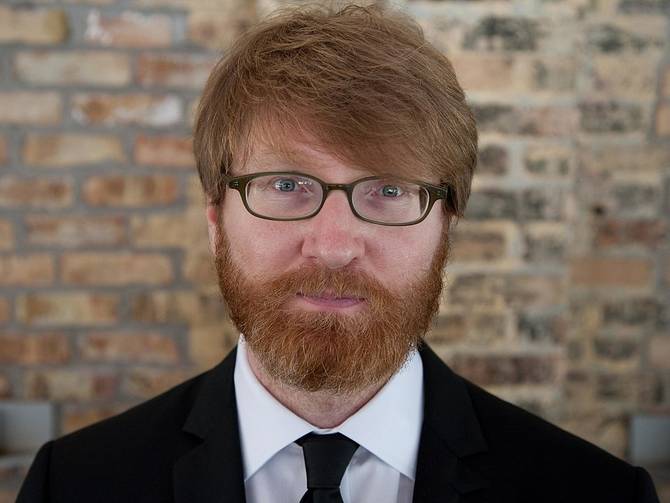

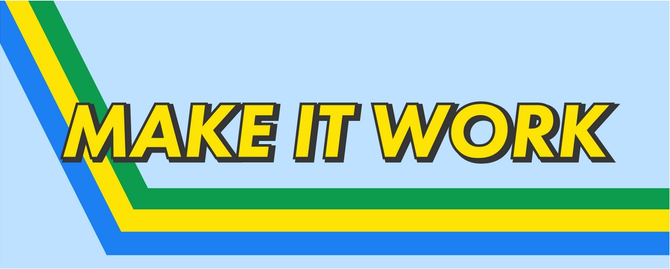
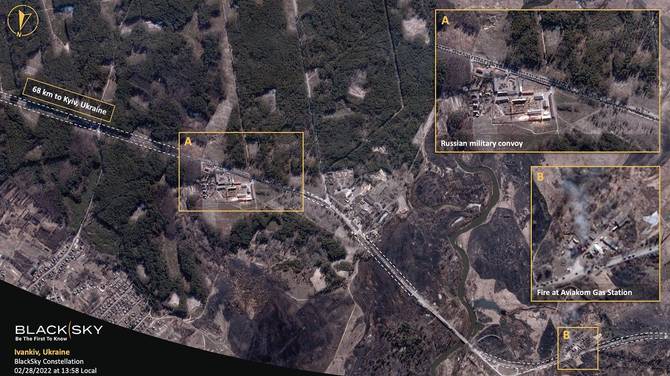




No comments:
Post a Comment